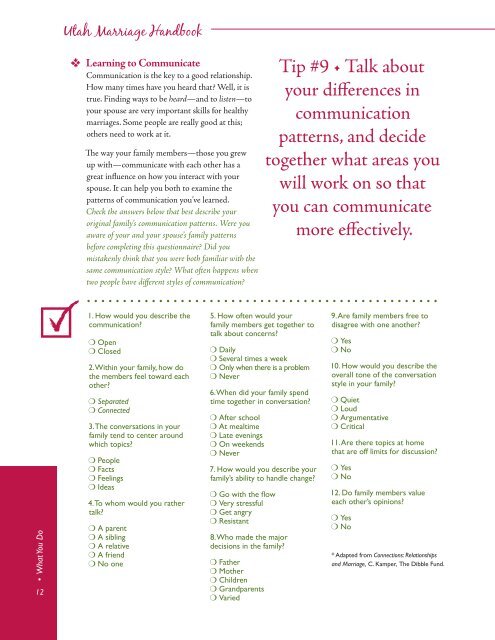The Utah Marriage Handbook - Stronger Marriage
The Utah Marriage Handbook - Stronger Marriage
The Utah Marriage Handbook - Stronger Marriage
Create successful ePaper yourself
Turn your PDF publications into a flip-book with our unique Google optimized e-Paper software.
• What You Do<br />
12<br />
<strong>Utah</strong> <strong>Marriage</strong> <strong>Handbook</strong><br />
Learning to Communicate<br />
Communication is the key to a good relationship.<br />
How many times have you heard that? Well, it is<br />
true. Finding ways to be heard—and to listen—to<br />
your spouse are very important skills for healthy<br />
marriages. Some people are really good at this;<br />
others need to work at it.<br />
<strong>The</strong> way your family members—those you grew<br />
up with—communicate with each other has a<br />
great influence on how you interact with your<br />
spouse. It can help you both to examine the<br />
patterns of communication you’ve learned.<br />
Check the answers below that best describe your<br />
original family’s communication patterns. Were you<br />
aware of your and your spouse’s family patterns<br />
before completing this questionnaire? Did you<br />
mistakenly think that you were both familiar with the<br />
same communication style? What often happens when<br />
two people have different styles of communication?<br />
1. How would you describe the<br />
communication?<br />
m Open<br />
m Closed<br />
2. Within your family, how do<br />
the members feel toward each<br />
other?<br />
m Separated<br />
m Connected<br />
3. <strong>The</strong> conversations in your<br />
family tend to center around<br />
which topics?<br />
m People<br />
m Facts<br />
m Feelings<br />
m Ideas<br />
4. To whom would you rather<br />
talk?<br />
m A parent<br />
m A sibling<br />
m A relative<br />
m A friend<br />
m No one<br />
5. How often would your<br />
family members get together to<br />
talk about concerns?<br />
m Daily<br />
m Several times a week<br />
m Only when there is a problem<br />
m Never<br />
6. When did your family spend<br />
time together in conversation?<br />
m After school<br />
m At mealtime<br />
m Late evenings<br />
m On weekends<br />
m Never<br />
7. How would you describe your<br />
family’s ability to handle change?<br />
m Go with the flow<br />
m Very stressful<br />
m Get angry<br />
m Resistant<br />
8. Who made the major<br />
decisions in the family?<br />
m Father<br />
m Mother<br />
m Children<br />
m Grandparents<br />
m Varied<br />
Tip #9 • Talk about<br />
your differences in<br />
communication<br />
patterns, and decide<br />
together what areas you<br />
will work on so that<br />
you can communicate<br />
more effectively.<br />
9. Are family members free to<br />
disagree with one another?<br />
m Yes<br />
m No<br />
10. How would you describe the<br />
overall tone of the conversation<br />
style in your family?<br />
m Quiet<br />
m Loud<br />
m Argumentative<br />
m Critical<br />
11. Are there topics at home<br />
that are off limits for discussion?<br />
m Yes<br />
m No<br />
12. Do family members value<br />
each other’s opinions?<br />
m Yes<br />
m No<br />
* Adapted from Connections: Relationships<br />
and <strong>Marriage</strong>, C. Kamper, <strong>The</strong> Dibble Fund.




